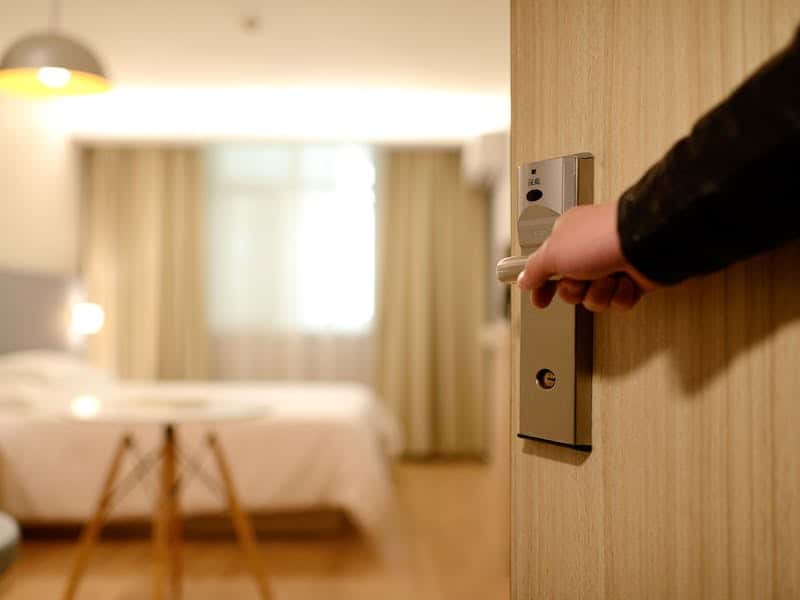If you’ve seen ‘pay at property’ when booking a hotel room, you may have wondered what it means.
If you’re short on time, here’s the key takeaway: Pay at property means you will pay for your hotel stay directly to the hotel when you check-in or check-out, rather than prepaying at the time of booking.
This in-depth article will cover everything you need to know about booking pay at property hotel rooms. We’ll explain the meaning of pay at property, its benefits and drawbacks, typical policies, fees you may encounter, and tips for having a smooth stay when paying at the hotel itself.
What Does Pay at Property Mean?
Pay at Property is a term commonly used in the hotel industry to describe a payment method where guests settle their bills directly with the hotel upon arrival or departure. Unlike other booking options where payment is made in advance, Pay at Property allows guests to pay for their stay at the hotel itself.
You pay the hotel directly upon arrival or departure
When you choose the Pay at Property option, you can enjoy the convenience of paying for your hotel room directly at the property.
This means that you don’t have to worry about making any payments online or through third-party platforms before your stay. You simply settle the bill with the hotel staff when you check-in or check-out.

No deposit or prepayment required at booking
One of the advantages of Pay at Property is that it doesn’t require any deposit or prepayment at the time of booking.
This can be a relief for travelers who prefer not to make upfront payments or who may be unsure of their travel plans in advance. With Pay at Property, you can reserve your room without having to provide any financial commitment upfront.
Hotel confirms the booking but does not collect payment upfront
When you choose the Pay at Property option, the hotel will confirm your booking but will not collect any payment upfront. This means that you can secure your reservation without having to provide any credit card details or make any immediate payments.
It’s important to note that some hotels may still require a credit card as a guarantee, but the actual payment will be made at the property.
Common with smaller independent hotels
Pay at Property is more commonly offered by smaller independent hotels rather than larger hotel chains.
This is because smaller hotels often have different payment systems in place and may not have the infrastructure to process online payments. Pay at Property can be seen as a more personal and traditional way of handling hotel payments.
Benefits of Pay at Property Hotel Bookings
More flexibility if you need to change plans
One of the major benefits of choosing a pay at property hotel booking is the flexibility it offers. Life can be unpredictable, and sometimes plans change unexpectedly.
With pay-at-property bookings, you have the advantage of being able to modify or cancel your reservation without any upfront payment. This means that if your travel plans suddenly change, you won’t be burdened with cancellation fees or the hassle of getting a refund.

No upfront payment needed
Another significant advantage of pay at property hotel bookings is that you don’t have to make any upfront payment. This can be particularly beneficial if you’re on a tight budget or prefer to keep your funds available until you actually arrive at the hotel.
By choosing to pay at the property, you can use your money for other expenses or unexpected costs that may arise during your trip.
Better cancellation terms in most cases
When you opt for pay at property hotel bookings, you often get better cancellation terms compared to pre-paid reservations. While cancellation policies may vary from hotel to hotel, pay at property bookings generally allow for more lenient cancellation terms.
This means that you may have the flexibility to cancel or modify your reservation closer to your check-in date without incurring any penalties.
Opportunity to inspect room before paying
One unique advantage of pay at property hotel bookings is the opportunity to inspect your room before making any payment. This can be particularly useful if you have specific preferences or concerns about your accommodation.
By paying at the property, you have the chance to check the room’s cleanliness, amenities, and overall suitability before finalizing your payment. If you’re not satisfied with the room, you can discuss alternatives or make changes without any financial commitment.

Potential Drawbacks and Considerations
Hotel may put a hold on your account for the stay amount
One potential drawback of choosing the “pay at property” option for hotel bookings is that the hotel may put a hold on your account for the full amount of your stay.
This is common practice to ensure that they have access to the funds needed to cover your reservation.
While this hold is typically released after you check out, it can tie up your funds temporarily and affect your available balance. It’s important to keep this in mind when planning your budget for your trip.
Higher likelihood of booking issues or lost reservations
Another consideration when opting for “pay at property” is that there may be a higher likelihood of booking issues or lost reservations. Since you haven’t paid in advance, there’s a chance that the hotel could accidentally overbook or lose track of your reservation.
While this is not very common, it can still be a frustrating experience, especially if you arrive at the hotel only to find that they don’t have a room available for you. To minimize the risk, it’s always a good idea to call the hotel ahead of time to confirm your reservation.
May need to provide payment info or deposit upon check-in
In some cases, hotels may require you to provide payment information or a deposit upon check-in if you choose the “pay at property” option. This is done as a security measure to protect the hotel in case of any damages or incidentals during your stay.
It’s important to be prepared for this possibility and have a valid credit card or sufficient cash available when you arrive at the hotel.
Less consumer protection if issues arise
When you choose to pay at the property, you may have less consumer protection if any issues arise during your stay. If you have already paid in advance through a third-party booking platform, you may have more leverage in resolving any problems or disputes with the hotel.
However, if you haven’t paid upfront, it may be more challenging to seek compensation or refunds if you encounter issues such as poor service, cleanliness problems, or unexpected charges. It’s essential to read and understand the hotel’s cancellation and refund policies before making your decision.
What to Expect at Check-In and Checkout
When booking a hotel with the “Pay at Property” option, there are a few things you should expect at check-in and checkout to ensure a smooth experience during your stay.
Be prepared to provide a credit card or pay full stay cost
Upon check-in, you will likely be asked to provide a credit card for any incidental charges or as a guarantee for the room.
Some hotels may also require you to pay the full cost of your stay upfront. This is to ensure that they have a form of payment in case of any additional expenses or damages during your stay.
Understand the cancellation policy before booking
Before finalizing your reservation, it is essential to understand the hotel’s cancellation policy.
While many hotels offer flexible cancellation options, some may have stricter policies, especially for “Pay at Property” bookings. Make sure you are aware of any penalties or fees that may apply if you need to cancel or modify your reservation.
Get all payment info and receipts at checkout
At the end of your stay, when it’s time to check out, make sure to ask for all payment information and receipts.
This includes any charges made to your credit card during your stay, as well as a detailed breakdown of the costs. Having this information will help you reconcile your expenses and address any discrepancies if necessary.
Ask about deposit requirements and fees in advance
Prior to your arrival, it is advisable to contact the hotel and inquire about any deposit requirements or additional fees. This will help you plan your budget accordingly and avoid any surprises at check-in.
Additionally, asking in advance allows you to clarify any doubts or concerns you may have regarding the payment process.
Remember, each hotel may have different policies and procedures, so it’s always a good idea to familiarize yourself with the specific terms and conditions of your chosen accommodation. By understanding what to expect at check-in and checkout, you can ensure a hassle-free experience during your stay.
Tips for a Smooth Pay at Property Hotel Stay
Book early and call to confirm policies ahead of time
When opting for a pay at property hotel stay, it is important to book your reservation well in advance. This will not only ensure that you secure a room, but also give you plenty of time to familiarize yourself with the hotel’s policies.
To avoid any last-minute surprises, it is recommended to call the hotel directly to confirm their pay at property policy. This way, you can clarify any doubts or concerns you may have and ensure a smooth check-in process.

Ask for the cancellation policy and get it in writing
Cancellation policies can vary from one hotel to another, so it is crucial to understand the terms and conditions before finalizing your reservation. When booking a pay at property hotel stay, it is advisable to ask for the cancellation policy in writing.
This will serve as proof in case of any disputes or misunderstandings later on. Additionally, getting the policy in writing will also help you plan your trip accordingly and make any necessary changes without incurring unnecessary charges.
Pre-authorize your card instead of paying a large deposit
One advantage of choosing pay at property hotel bookings is the option to pre-authorize your credit card instead of paying a large deposit upfront. Pre-authorization allows the hotel to temporarily hold a certain amount on your card, ensuring that you have the necessary funds to cover your stay.
This way, you can avoid tying up a significant amount of money in a deposit and have more flexibility with your budget during your trip.
Double check reservations to avoid complications at check-in
Before you embark on your journey, it is essential to double check your hotel reservations to avoid any complications at check-in. Make sure you have the correct dates, room type, and any special requests noted in your reservation.
This will help prevent any misunderstandings or mix-ups when you arrive at the hotel. Taking a few minutes to review your reservation details can save you time and potential headaches during your stay.
Conclusion
Booking a ‘pay at property’ hotel means you pay the hotel directly at check-in or checkout, which offers flexibility but less security than prepaying.
Know the policies, get confirmation details, and authorize any deposit required to avoid issues. With some planning, pay at property can mean a smooth, convenient hotel stay.






